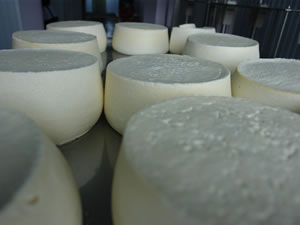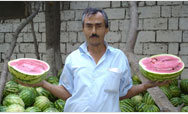Georgia Celebrates Start of Industrial Cheese Production
The opening of two modern cheese plants in the adjacent villages of Orlovka and Spasovka on June 21 turned into a real celebration for farmers in Georgia’s Javakheti region. For them, the event not only marks the first successful attempt at industrializing cheese production in Georgia, but also provides hope for a better future through reviving the region's dairy industry.
The newly opened plants are the country's first suppliers of safe, quality cheese. After the collapse of the Soviet Union, cheese production shifted from state-owned farms to the private sector. This led to poor sanitary conditions during milking and the preservation process and, consequently, dairy products of questionable quality. Modern cheese plants will provide customers with top quality products.
“From now on, people will have a chance to buy high-quality, locally produced industrially processed cheese,” says Nika Grdzelidze, deputy director-general of the AgVANTAGE project.
At the same time, these enterprises will bring significant economic benefits to Javakheti. The predominately ethnic Armenian-populated region was once one of the country's leading producers of raw milk and dairy production has long been one of the only sources of income for the region's farmers. Since the demise of the Soviet Union, however, Javakheti has endured a host of economic difficulties resulting in dramatically decreased production levels, several abandoned factories, and high unemployment rates.
 |
| The opening of two new cheese plants marks the industrialization of cheese production in Georgia and gives hope to farmers in the Javakheti region |
In an effort to revive Javakheti's dairy production, USAID’s AgVANTAGE project cooperated with two local milk processors, Orlovka Cooperative and Spasovka Ltd, to construct two modern cheese processing plants in Ninotsminda District. Modern cheese production equipment was installed in each plant and proper pasteurization, separation, cheese maturation and packaging practices were introduced. AgVANTAGE also assisted with the rehabilitation of six dairy farms in the region to demonstrate the development of a complete dairy production chain and to enable the milk processing plants to purchase high quality raw milk.
During their visit to Javakheti at the opening of the Spasovka plant on June 21, President of Georgia Mikheil Saakashvili, Minister of Agriculture Petre Tsiskarishvili and other government authorities observed the production process after the ribbon-cutting ceremony and had the privilege of tasting the first sample of industrially produced Georgian cheese.
“The most important thing that has happened in this region during recent years is that it has been fully integrated into Georgia. Now, people are more confident here and this cheese is the result,” President Mikheil Saakashvili said.
Combined, these two modern cheese plants will be capable of processing up to 10 tons of raw milk and producing 1,000 kg of cheese per day, with annual sales reaching an estimated GEL 700,000. They will provide a stable source of income for more than 800 farmers in the region and direct employment for 25 to 30 individuals. Moreover, the proposed technology will enable Spasovka Ltd. and Orlovka Ltd. to produce a competitive product and replace large quantities of imported hard cheese. The plants will also serve as business models for dairy entrepreneurs throughout Georgia.
Of particular significance, the location for these cheese plants was based upon the construction of a new, modern road funded by the Millennium Challenge Corporation which will dramatically reduce transportation costs to Tbilisi. These factories therefore serve as one of the first examples of the economic benefit the new road will bring to this remote region.
“Georgians, Russians and Armenians who live in this village and farmers from four neighboring villages will benefit from this cheese plant. The opening of this factory means the end of poverty for local farmers, it is a sign of hope and beginning of better life,” says factory owner Lekso Mikeladze.
Back to Top ^ |


